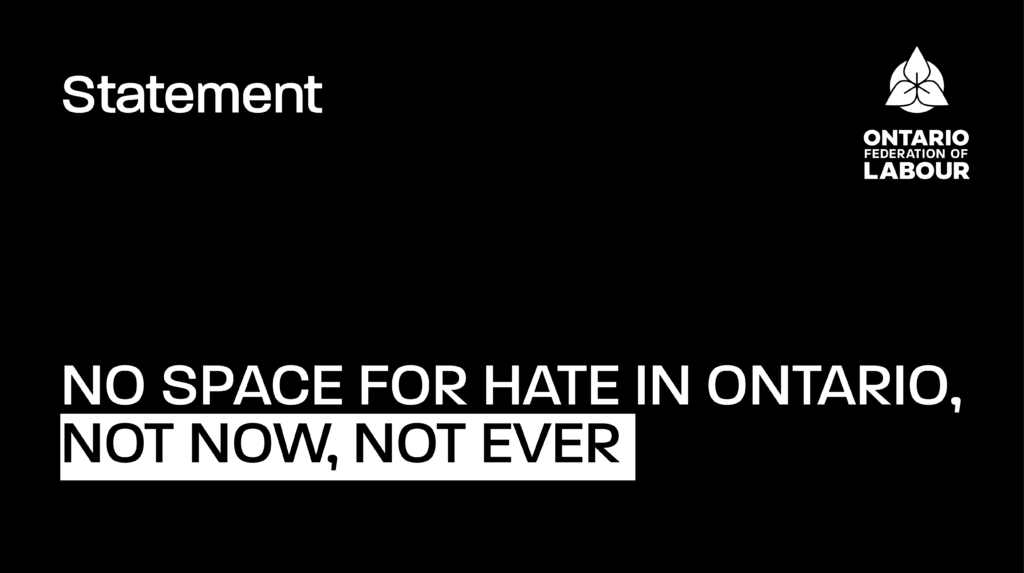
Racism, bigotry and hatred know no boundaries, no borders, and no limits.
Canadian headlines teem with tales of hate crimes. An Ottawa rabbi awoke to find a swastika spray-painted on her door. A Mississauga Jewish family had their home egged. An east Toronto neighbourhood was plastered with white supremacist recruitment posters. Muslim women have been verbally and physically assaulted. CBC recently reported that there has been a 600 per cent jump in the past year in how often Canadians use language online that’s racist, Islamophobic, sexist or otherwise intolerant. It can lead to devastating consequences, as we saw recently when six worshippers were killed as they prayed at the Centre Culturel Islamique de Québec in Québec City.
Yet, out of these desperate circumstances, inspiring courage and tenacity has led to an upsurge in grass roots activism within each of these communities that has demanded social and economic change. Long-ignored land claims disputes, a history of cultural genocide and the grinding poverty on reservations have led to the growth of the Idle No More movement for Indigenous justice; racially motivated ‘carding’ and police shootings have spurred a Black Lives Matter movement across North America; and recently, the racist backlash against Muslim people has inspired a Stronger Together movement of Muslims and allies to challenge Islamophobia in Canada.
We know that insecure work is at the core of racial inequality in Ontario. Although workers of colour have slightly higher levels of labour market participation, they continue to experience higher levels of unemployment and earn a lower income than non-racialized Canadians. In fact, as a whole Canadians of colour earn 81 cents for every dollar paid to non-racialized Canadians. This wage gap is even wider for Indigenous and workers of colour that are female, have accessibility issues, and/or are recent newcomers. This racialized wage differential is partly due to the lack of opportunity afforded to Indigenous workers and workers of colour in accessing well paying, secure jobs. The OFL’s Make It Fair campaign calls on the Ontario government to make changes to its employment and labour laws which will alleviate some of these inequities that are faced by precarious workers across the province.
This year we have an opportunity to improve the work lives of racialized people across Ontario through the Changing Workplaces Review. The OFL calls on the government to apply an equity lens on employment conditions in Ontario and make meaningful changes to the Employment Standards and the Labour Relations Acts that will create decent work for all Ontarians.
The government must also introduce effective employment regulating legislation to ensure that all Ontarians have fair and equitable opportunities in the labour market. This piece of legislation must assist in removing employment barriers, establishing transparent human resource policies and practices, and cultivating a culture of equity and inclusion in all Ontario workplaces.
The OFL has welcomed the recent Ontario government’s Anti-Racism Directorate several of the announcements made around the government’s Three Year Anti-Racism Strategic Plan. The Federation has joined with The Colour of Poverty Colour of Change calling for immediate action to eliminate poverty, end employment precarity and close the wage gap that disproportionately affect racialized communities and prevent the advancement of every worker. The startling effects of poverty and inequality are perhaps most starkly exposed in the rise in youth violence, the exploitation of migrant workers and the squalid conditions that are endemic to many of Canada’s Aboriginal communities. However, Ontario’s growing inequality is more than just poverty.
Precarious jobs without fair wages, benefits, job security or union representation now comprise nearly half of all jobs in Ontario and disproportionately impact racialized people and new immigrants who can spend decades in vulnerable jobs. Yet, out of these desperate circumstances, inspiring courage and tenacity has led to an upsurge in grass roots activism within each of these communities that has demanded social and economic change.
The International Day for the Elimination of Racial Discrimination is observed annually on March 21st. On that day, in 1960, police opened fire and killed 69 people at a peaceful demonstration against the apartheid “pass laws” in Sharpeville, South Africa. The United Nations General Assembly proclaimed the day in 1966 and called on the international community to redouble its efforts to eliminate all forms of racial discrimination.
The Ontario Federation of Labour (OFL) represents 54 unions and one million workers in Ontario. For information, visit www.OFL.ca and follow the OFL on Facebook and Twitter: @OFLabour.


